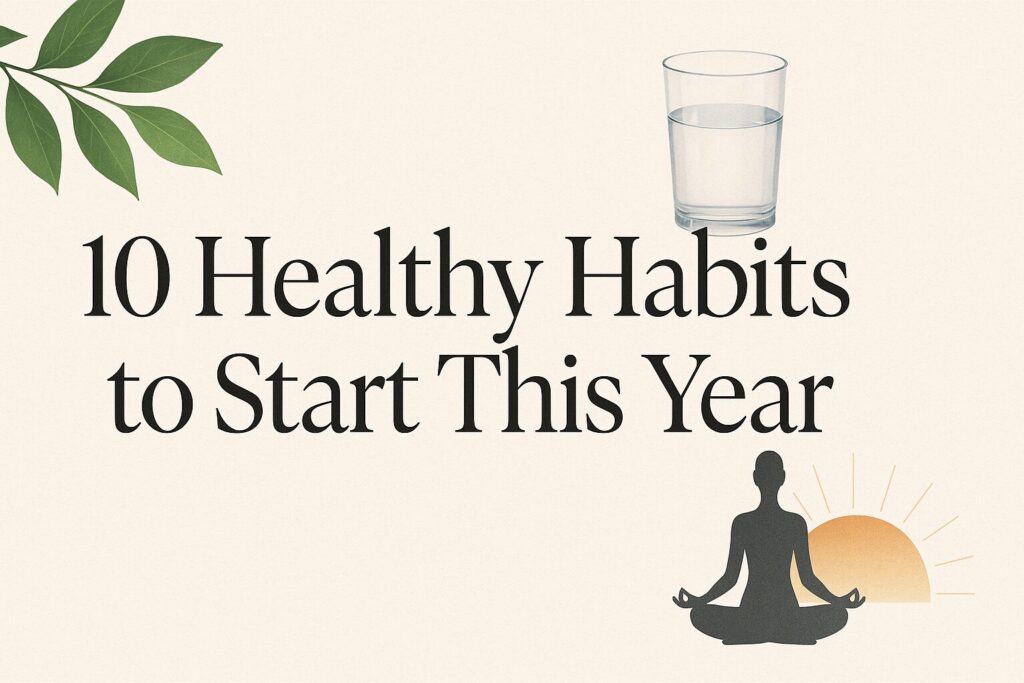Start the year with simple, powerful changes! Discover 10 healthy habits that can transform your body, mind, and lifestyle easy to follow and perfect for long term wellness.
Table of Contents
Introduction
Every new year brings a fresh opportunity to reset your priorities and build a healthier, more balanced lifestyle. But instead of aiming for drastic overnight changes, focusing on small, sustainable habits can lead to lasting transformation. The good news? You don’t need an expensive gym membership or a complicated routine to start living better. Simple daily practices like drinking more water, sleeping well, and moving your body can make a huge difference over time.
In this post, we’ll explore 10 healthy habits that are easy to adopt yet powerful in impact. These habits are designed to improve your physical health, boost mental clarity, and enhance overall well being. Whether you’re just starting your wellness journey or looking to level up your daily routine, these ideas are the perfect place to begin.
Start Your Day with a Glass of Water
One of the simplest yet most impactful habits you can adopt this year is drinking a glass of water first thing in the morning. After 6 to 8 hours of sleep, your body wakes up dehydrated, and replenishing fluids early in the day helps kickstart your metabolism, improve digestion, and flush out toxins.
Hydration is essential for overall health your body uses water in every cell, tissue, and organ to regulate temperature, maintain bodily functions, and transport nutrients. Drinking water right after waking up can also improve your mental clarity and energy levels throughout the day.
If you find it hard to remember, place a bottle or glass of water next to your bed. For added benefits, try warm water with lemon it aids in digestion, boosts vitamin C intake, and supports immune health. Some people even add a pinch of Himalayan salt for electrolytes.
While coffee might be your usual go to morning beverage, it’s best consumed after water. Caffeine can act as a diuretic, increasing fluid loss. By hydrating first, you create a solid foundation for your body’s needs.
This small morning ritual takes less than a minute but contributes greatly to your long-term well-being. It’s an easy, no cost habit that sets a healthy tone for the rest of your day.
Prioritize 7–8 Hours of Quality Sleep Each Night
Getting 7 to 8 hours of quality sleep isn’t just a luxury it’s a necessity for your body and mind to function properly. Sleep is when your body repairs cells, balances hormones, and consolidates memories. Yet in today’s fast paced world, many people sacrifice rest in favor of productivity, often at the expense of their health.
Chronic sleep deprivation is linked to a range of health issues including weight gain, weakened immunity, high blood pressure, and poor concentration. It can also affect your mood, increasing irritability, anxiety, and even depression over time. That’s why making sleep a priority is one of the smartest habits you can build this year.
To improve sleep quality, focus on creating a consistent sleep schedule go to bed and wake up at the same time every day, even on weekends. Create a relaxing bedtime routine, such as dimming the lights, reading a book, or taking a warm shower to signal your body it’s time to wind down. Avoid screens at least an hour before bed, as blue light can suppress melatonin, the hormone that regulates sleep.
Additionally, keep your bedroom cool, quiet, and dark. Investing in a comfortable mattress and pillows can also significantly improve your rest. If you struggle with sleep, limit caffeine intake in the afternoon and try mindfulness or breathing exercises before bed.
By making sleep a priority, you’ll notice improvements in focus, mood, and overall health setting a strong foundation for all the other healthy habits you want to build.
Move Your Body Daily with Light Exercise or Walking
Regular movement is one of the most effective ways to maintain physical and mental health. You don’t need an intense gym routine to stay healthy simply committing to light daily exercise, such as walking, stretching, or yoga, can have tremendous benefits over time.
Daily movement improves circulation, strengthens muscles, boosts flexibility, and helps regulate weight. It also plays a vital role in improving cardiovascular health and managing blood sugar levels. For mental well-being, physical activity releases endorphins natural mood enhancers that help reduce stress, anxiety, and even mild symptoms of depression.
If you’re just starting out or have a busy schedule, aim for at least 20–30 minutes of walking each day. Take the stairs instead of the elevator, go for a quick stroll after meals, or follow a short home workout routine. The key is consistency making movement a non negotiable part of your day.
You can make it enjoyable by listening to music or a podcast while walking, or involving a friend or family member to stay motivated. You don’t need to do the same activity every day rotate between walking, stretching, light strength training, dancing, or cycling to keep it fun and balanced.
Over time, these small efforts compound into significant health improvements. More energy, better posture, deeper sleep, and a greater sense of well-being all from simply moving your body a little each day.
Eat More Whole Foods and Cut Down on Processed Meals
One of the most transformative habits you can build for your health is shifting your diet toward whole, unprocessed foods. Whole foods like fresh fruits, vegetables, whole grains, legumes, nuts, seeds, and lean proteins are packed with essential nutrients, fiber, and antioxidants that support long term health and disease prevention.
In contrast, processed foods are often high in added sugars, refined oils, artificial additives, and unhealthy fats. While convenient, regular consumption of highly processed meals is linked to increased risks of obesity, type 2 diabetes, heart disease, and even certain types of cancer. These foods are often calorie dense but nutritionally poor, leaving you feeling unsatisfied and more likely to overeat.
To start, focus on gradual changes. Swap sugary cereals with oats and fruit, replace soda with water or herbal tea, and choose whole grain bread over white bread. Incorporate more fresh produce into your meals, and aim to “eat the rainbow” a variety of colorful vegetables and fruits to ensure a wide range of nutrients.
Planning and prepping meals ahead of time can help you avoid the temptation of packaged or fast food. Cooking at home not only saves money but also gives you full control over ingredients and portion sizes.
Remember, it’s not about perfection. Allow yourself flexibility while making better choices most of the time. By building a diet based on whole foods, you’ll experience more stable energy levels, improved digestion, clearer skin, and a stronger immune system.
Practice Mindfulness or Meditation for 10 Minutes a Day
In a world full of constant notifications, distractions, and responsibilities, carving out just 10 minutes a day for mindfulness or meditation can have a profound effect on your mental and emotional health. Mindfulness is the practice of being fully present and aware in the moment without judgment. Meditation, often used as a tool for mindfulness, helps calm the mind and reduce stress.
Studies have shown that regular mindfulness practice can lower cortisol levels (the stress hormone), reduce anxiety and depression, improve focus, and enhance emotional regulation. It also promotes a greater sense of inner peace and clarity, even in the midst of a hectic day.
You don’t need a fancy setup or long sessions to get started. Simply find a quiet space, sit comfortably, close your eyes, and focus on your breath. If your mind wanders which it will gently bring it back to your breath without self criticism. This simple exercise can help anchor you in the present moment.
There are also many guided meditation apps like Headspace, Insight Timer, or Calm that offer short, beginner-friendly sessions. You can also practice mindfulness during daily activities such as eating, walking, or even washing dishes by slowing down and fully experiencing the task.
With consistent practice, you’ll notice an improved ability to handle stress, better sleep, sharper focus, and a calmer mind. It’s a small habit with enormous mental and emotional payoffs.
Limit Screen Time and Take Regular Digital Breaks
In today’s digital age, screens are everywhere from smartphones and laptops to TVs and tablets. While technology offers convenience and connectivity, excessive screen time can have negative effects on your physical and mental health. That’s why making a conscious effort to limit screen usage and take regular digital breaks is a powerful habit to adopt this year.
Too much screen time can lead to eye strain, poor posture, headaches, disrupted sleep, and decreased physical activity. Mentally, it can increase stress, anxiety, and feelings of isolation especially with constant social media scrolling or news consumption. Additionally, prolonged screen exposure, especially before bed, interferes with melatonin production, making it harder to fall and stay asleep.
One way to reduce screen time is to follow the 20-20-20 rule: every 20 minutes, look at something 20 feet away for at least 20 seconds. This helps reduce eye strain and encourages movement. Set specific “no screen” zones or times during the day such as during meals, the first hour after waking, or the hour before bedtime.
You can also track your screen usage with built-in digital wellbeing tools on your phone or install apps that remind you to take breaks. Use that downtime for offline activities like reading, stretching, journaling, or spending quality time with loved ones.
Digital detoxing doesn’t mean cutting off technology completely it’s about finding balance. By taking control of your screen time, you’ll experience better focus, improved sleep, and a greater connection to the present moment.
Build a Consistent Morning and Night Routine
A structured morning and night routine sets the tone for your entire day and helps you wind down smoothly at night. Establishing consistent habits at the start and end of your day can improve productivity, reduce stress, and boost overall well-being.
A healthy morning routine helps you begin your day with intention and energy. It doesn’t have to be complicated. Start by waking up at the same time each day and avoid checking your phone right away. Drink water, stretch or do light movement, and take a few moments for mindfulness or journaling. A nourishing breakfast and a short walk outside can also positively influence your mood and focus.
Your nighttime routine is just as important. A consistent wind-down process signals your body that it’s time to sleep. Start by shutting off electronic devices at least 30–60 minutes before bed to reduce blue light exposure. Engage in calming activities like reading, taking a warm shower, or listening to soft music. You can also use this time to reflect on the day and set intentions for tomorrow.
The goal is consistency try to wake up and go to sleep at the same times every day. Over time, this helps regulate your internal clock (circadian rhythm), making it easier to fall asleep and wake up naturally.
By creating and sticking to a morning and night routine, you set yourself up for more balanced days, better mental clarity, and improved sleep quality all of which support long-term health.
Read or Learn Something New Every Day
Incorporating learning into your daily routine is a powerful way to keep your mind sharp, expand your knowledge, and grow as a person. Whether it’s reading a few pages of a book, listening to a podcast, watching an educational video, or learning a new word committing to learning something new each day adds immense value to your personal development.
Reading, in particular, improves vocabulary, comprehension, focus, and empathy. It reduces stress and stimulates brain activity especially when you read nonfiction, self-help, or inspirational content. Even fiction enhances creativity and emotional intelligence.
You don’t need to devote hours just 10–20 minutes a day is enough. You could keep a book by your bedside, read while commuting, or replace some social media scrolling with articles or audiobooks. Choose topics that interest or challenge you whether it’s health, history, psychology, business, or a new language.
Beyond reading, consider trying micro-learning platforms or mobile apps like Duolingo (for languages), Coursera or Skillshare (for skills), or even TED Talks. You can also use journaling as a way to reflect on what you’ve learned and apply it in real life.
Daily learning isn’t just about accumulating facts it’s about growth. This habit fosters curiosity, improves decision making, boosts confidence, and keeps your mind agile. In a world that’s constantly changing, being a lifelong learner is one of the most empowering habits you can build.
Schedule Regular Health Check-Ups and Screenings
Preventive care is one of the most overlooked yet essential aspects of maintaining good health. While many people only visit the doctor when something feels wrong, regular health check-ups and screenings can detect potential issues early often before symptoms even appear.
Routine medical exams help monitor key health indicators like blood pressure, cholesterol, blood sugar, weight, and more. Depending on your age, gender, and medical history, your doctor may also recommend screenings for conditions such as diabetes, heart disease, certain cancers, or vitamin deficiencies. Early detection greatly increases the chances of successful treatment and long-term wellness.
These appointments also offer a valuable opportunity to discuss lifestyle habits, mental health, vaccinations, sleep quality, or any unusual changes in your body. Even a yearly dental and eye exam contributes to your overall health and quality of life.
Many people skip check-ups due to time constraints or fear of results but ignoring health won’t make problems go away. By staying proactive, you gain peace of mind and maintain control over your well-being. Make it a goal this year to schedule appointments with your general physician, dentist, and any specialists you may need.
You can also keep a simple health journal to track symptoms, allergies, medications, and test results. This makes visits more efficient and helps you better understand your own body.
Taking charge of your health through regular check-ups is an act of self-care and responsibility. It’s not just about adding years to your life it’s about adding quality to those years.
Express Gratitude and Keep a Daily Journal
Practicing gratitude and journaling daily is a simple but deeply transformative habit. It shifts your focus from what’s lacking to what’s present and meaningful in your life. Over time, this habit can rewire your mindset, reduce stress, improve mood, and enhance emotional well-being.
Gratitude journaling doesn’t require much time just a few minutes a day. You can start or end your day by writing down three things you’re grateful for. They don’t have to be big; even small moments like a kind word, a sunny morning, or a hot cup of tea count. This habit encourages you to notice and appreciate the good that often goes unnoticed.
Along with gratitude, journaling can be a space to reflect on your thoughts, track progress, set intentions, and release negative emotions. It provides clarity, boosts self-awareness, and can help you process difficult experiences more calmly. Over time, your journal becomes a record of personal growth a reminder of how far you’ve come.
You can use a physical notebook or a digital app whichever feels more comfortable. Some people prefer free writing, while others like using prompts such as:
- What made me smile today?
- What challenges did I face and what did I learn?
- What’s one thing I want to improve tomorrow?
This simple ritual takes only 5–10 minutes but can significantly improve your mindset and emotional resilience. By making gratitude and journaling part of your daily life, you create a more positive, grounded, and reflective version of yourself.
Conclusion
Creating a healthier lifestyle doesn’t require perfection it simply starts with intention and consistency. The habits shared in this post are not about quick fixes, but about building a foundation for long-term well-being. From prioritizing sleep and eating whole foods to practicing mindfulness and expressing gratitude, each small action contributes to a more vibrant, balanced life.
Start with one or two habits, and gradually build from there. Even tiny changes, done consistently, can lead to big results over time. Remember: your health is your most valuable asset nurture it daily. This year, make yourself a priority and take small steps toward becoming the best version of you.
More Content like this :
10 Ways to Instantly Reduce Stress Naturally
7 Home Remedies for Common Cold That Actually Work
Fig and Fig Wasp : 10 Mind-Blowing Secrets Behind Their Connection



